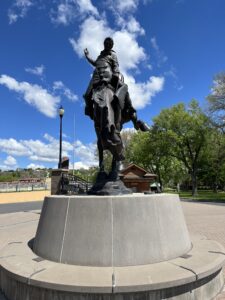
Photo credit: Brekkan Richardson
Hello everyone! My name is Brekkan Richardson and I have the amazing opportunity of working with Clackamas County 4-H as an intern this summer! Though this position brings many new connections and responsibilities, it also brings an air of familiarity. As a former 4-H member in Clackamas County myself, I entered this internship with a slight sense of confidence. My reasoning was that even if I had to watch some YouTube videos to help me unlock the secrets of a copy machine – at the end of the day, I knew what to expect when fair time rolled around. That is until the time finally came for me to provide on-site support. This support wasn’t during swine weigh-in, beef showmanship, or even small-animal health checks but a couple weeks before these events at the Clackamas County Horse Fair. Due to the size and scheduling demands of the Clackamas County Horse Program, the horse fair happens on a separate week from the remainder of the county fair. As a 4-H member, I happily explored the other project areas at the fair. Due to the nature of scheduling, Horse 4-H had not crossed my path often. The opportunity to learn more had come around even less.
Despite my lack of equine experience, I remained confident I could navigate this unfamiliar fair with only mild confusion. This expectation proved unreasonable. Although the county and horse fair exhibitors shared their passion for their projects, the projects themselves held many differences. Having quickly discovered this, I decided to use my time at the horse fair to learn as much as possible.
Fortunately, the 4-H members seemed just as happy to answer questions as I was to ask them. On the first day on site, I was informed of the most prominent difference between most animal projects and the horse program. While most animal projects are centered around the production premise, the horse program instead follows an animal whose purpose is to perform. The differences don’t stop there, as some young 4-H members inform me later in the week. Where sheep showpeople show with a required level of physical contact, horse showmanship requires members to orchestrate their horse’s movements by halter alone. Where typically each animal enters the show ring a couple times during the fair, the horse fair has many more opportunities for members to engage in various unique competitions.
Through each class, show and barn walk-through, the 4-H members of Clackamas County happily and confidently showed off their hard work and talent. I look forward to learning more from 4-H members across Clackamas County. I hope to continue encouraging members to ask questions from our youth.





